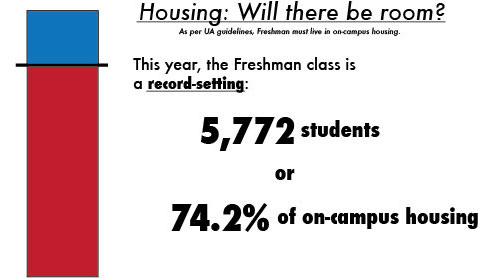 Despite the University of Alabama’s freshman residency program, there are still spaces available in on-campus housing. “We opened at 96 percent of total capacity in residence halls,” said Alicia Brown, associate director for Assignments, Information and Communication in Housing and Residential Communities. The freshman residency policy, first implemented in 2006, requires first year undergraduates to live in campus residence halls. “The University of Alabama is committed to providing all of its students with a comprehensive educational experience,” according to the Freshman Residency Program policy on UA’s Housing and Residential Communities website. “There are numerous educational and social benefits for first year students living in the residence halls that may not be realized by those living off campus.” “National research showed that students who live in residence halls are academically better off and meet new people,” said Alicia Browne. This policy may be disconcerting to upperclassmen that live in the dorms, as each incoming freshman class is bigger than the last. The fall 2011 freshman class is a record-setting 5,772 students. However, HRC currently offers 7,784 spaces in on-campus housing – ample additional space for students that wish to remain on campus after their freshman year. In addition, not every freshman lives on campus. There are freshman exemptions from the residency policy. The requirement is automatically waived for students who wish to reside in a parent or guardian’s residence. Students wishing to live off campus for other reasons can fill out a form found on myBama. “The most common reason [that students live off campus] is that the student lives in Tuscaloosa. The second most common reason is that a student lives with a family member,” Browne said. “Rarely, there might be a medical reason and the residence halls can’t meet their needs.” Browne said that for students considering on-campus housing, the spring semester is the most flexible. “The residence hall census can change literally every day, because students can move out or request room changes,” she said. However, despite heavy damage sustained by partially student-occupied neighborhoods like Cedar Crest during April 27’s tornado, there isn’t a large influx of students looking to return to dormitory life. “We’ve provided a lot of assistance off-campus,” Browne said. “There’s been very little decision for students to move back to the residence halls.” Margaret Coats, a junior living in an off-campus apartment complex, says she considered living on campus after her freshman year, but not for her junior year. “The dorm was too much to do again,” Coats said. “My apartment is quieter. The distance from campus isn’t a huge issue. You can walk if you’re motivated.”
Despite the University of Alabama’s freshman residency program, there are still spaces available in on-campus housing. “We opened at 96 percent of total capacity in residence halls,” said Alicia Brown, associate director for Assignments, Information and Communication in Housing and Residential Communities. The freshman residency policy, first implemented in 2006, requires first year undergraduates to live in campus residence halls. “The University of Alabama is committed to providing all of its students with a comprehensive educational experience,” according to the Freshman Residency Program policy on UA’s Housing and Residential Communities website. “There are numerous educational and social benefits for first year students living in the residence halls that may not be realized by those living off campus.” “National research showed that students who live in residence halls are academically better off and meet new people,” said Alicia Browne. This policy may be disconcerting to upperclassmen that live in the dorms, as each incoming freshman class is bigger than the last. The fall 2011 freshman class is a record-setting 5,772 students. However, HRC currently offers 7,784 spaces in on-campus housing – ample additional space for students that wish to remain on campus after their freshman year. In addition, not every freshman lives on campus. There are freshman exemptions from the residency policy. The requirement is automatically waived for students who wish to reside in a parent or guardian’s residence. Students wishing to live off campus for other reasons can fill out a form found on myBama. “The most common reason [that students live off campus] is that the student lives in Tuscaloosa. The second most common reason is that a student lives with a family member,” Browne said. “Rarely, there might be a medical reason and the residence halls can’t meet their needs.” Browne said that for students considering on-campus housing, the spring semester is the most flexible. “The residence hall census can change literally every day, because students can move out or request room changes,” she said. However, despite heavy damage sustained by partially student-occupied neighborhoods like Cedar Crest during April 27’s tornado, there isn’t a large influx of students looking to return to dormitory life. “We’ve provided a lot of assistance off-campus,” Browne said. “There’s been very little decision for students to move back to the residence halls.” Margaret Coats, a junior living in an off-campus apartment complex, says she considered living on campus after her freshman year, but not for her junior year. “The dorm was too much to do again,” Coats said. “My apartment is quieter. The distance from campus isn’t a huge issue. You can walk if you’re motivated.”
On the other hand, some upperclassmen miss the convenience of residence hall life. “The convenience of walking to class and the close proximity to all the dining halls almost outweighs the positive aspects of living off campus,” said Will Dodd, a junior who moved off campus after his freshman year. Despite varied opinions, Browne’s experience at Housing and Residential Communities is that once students leave, they rarely come back.









